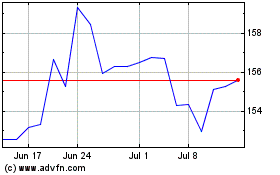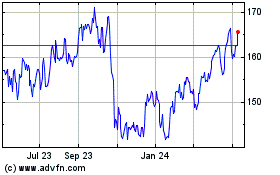By Bradley Olson and Sarah Kent
Most -- but not all -- top oil executives are seeing their pay
shrink, after a plunge in crude prices that has erased $200 billion
in stock-market value from the world's largest publicly traded
energy companies.
Bob Dudley, BP PLC's chief executive, enjoyed about a 20% bump
in pay to $19.6 million in 2015, despite his company's $5.2 billion
loss for the year and an accompanying stock-price decline of
11%.
Many BP shareholders are incensed by the increase, and
investor-advisory firms including Institutional Shareholder
Services are counseling them not to ratify Mr. Dudley's pay package
at the company's annual meeting Thursday.
"This proposed increase is both unreasonable and insensitive,"
said Ashley Hamilton Claxton, corporate-governance manager at Royal
London Asset Management, which holds BP shares worth about $600
million. She plans to vote against Mr. Dudley's pay.
BP defended the pay package. "Despite the very challenging
environment, BP's safety and operating performance was excellent
throughout 2015, and management also responded early and decisively
to the steep fall in the oil price," a company spokesman said.
Other executive pay packages shrank along with stock prices.
Exxon Mobil Corp. released data Wednesday that showed CEO Rex
Tillerson's salary rose 6% to $3 million in 2015 even as the
company's shares lost 15% of their value. But Mr. Tillerson's total
pay fell 18% to $27.3 million, due to a lower bonus, stock awards
and interest-rate-related changes in his pension.
For the past five years, oil giants Exxon, Chevron Corp., Royal
Dutch Shell PLC and BP have paid their top bosses nearly $500
million in combined compensation, even though the companies'
annualized returns for the period have undershot those of the
S&P 500.
In 2015, Chevron chief John Watson's pay, including salary,
bonus and stock options, rose 3%, but with pension-benefit changes
his total compensation fell by 15% to about $22 million.
Most of Mr. Watson's pay rises and falls with shareholder value,
based on stock prices, with added emphasis on safety and other
factors aligned with good corporate governance, said Kurt Glaubitz,
a company spokesman.
"Overall, Mr. Watson's 2015 compensation package recognizes and
reflects the value he continues to deliver to Chevron's
stockholders," Mr. Glaubitz said.
The salary and bonus of Anglo-Dutch Shell's CEO, Ben van Beurden
, who is paid in euros, fell 13% to $5.5 million when translated
into dollars.
Mr. van Beurden's overall pay for 2015, including pension
changes, tumbled 81%. Shell's profit for the year plunged 80%.
"Shell's executive compensation reflects delivery of our
strategy, measured by both short-term and long-term targets," said
Jonathan French, a Shell spokesman. "There is a clear alignment
between the company's performance and our compensation
policies."
Stockholders at Chevron, Exxon and Shell will get to vote on
executive pay next month -- though the votes aren't binding. At
those meetings, the companies are expected to outline their worst
first-quarter performances in decades, analysts say.
Including BP, the four biggest Western oil companies have laid
off, or are in the process of shedding, more than 25,000 workers
because of the protracted downturn in energy prices.
At the two dozen energy companies in the S&P 500 index,
median pay, excluding pension changes, fell less than 1% from 2014
last year, according to an analysis by ISS Corporate Solutions Inc.
That's far less than the cumulative 24% price decline for those
companies. Executive compensation in other industries, except for
retailing, increased last year.
In their annual filings, the biggest oil companies take pains to
explain the complexities of their senior executives' compensation,
including performance pay tied to the company's share price and
options that can take as long as a decade to vest. Those incentives
are paid out over the long term, but they often get counted as part
of annual pay packages.
Compensation packages at many energy companies are built to work
well in most market conditions, but some were never set up to
manage the impact of a crash in oil-and-gas prices, said John Roe,
head of advisory at ISS Corporate Solutions.
"Sometimes, that produces results that don't pass the smell
test," he said. "When that happens, companies need to step back and
make sure that they are more responsive and aligned with
shareholders. When they don't, they will run into issues year after
year."
ISS hasn't issued its recommendations on whether shareholders
should endorse or reject pay packages at Exxon, Chevron and Shell,
but says it will do so in coming weeks.
One reason for discrepancies between executive pay and stock
performance is that BP and other oil companies reward executives
based on relative shareholder returns. That can blunt the impact of
rising or falling oil prices because payouts depend more on how
well a company performs relative to its peers, said Kevin Murphy, a
professor at the University of Southern California's Marshall
School of Business.
Compared with the other three major oil companies, BP shares
fell the least in 2015, dropping 11.7% including reinvested
dividends, according to data from Morningstar. That is slightly
ahead of Exxon's 12.6% share-price decline. Chevron's stock fell
16% last year, while Shell's was down 26%.
(END) Dow Jones Newswires
April 13, 2016 20:43 ET (00:43 GMT)
Copyright (c) 2016 Dow Jones & Company, Inc.
Chevron (NYSE:CVX)
Historical Stock Chart
From Mar 2024 to Apr 2024

Chevron (NYSE:CVX)
Historical Stock Chart
From Apr 2023 to Apr 2024
